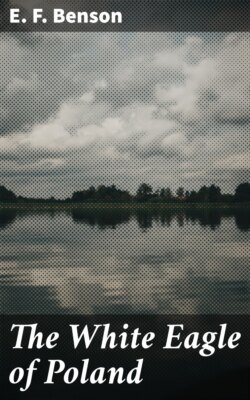Читать книгу The White Eagle of Poland - E F Benson - Страница 3
На сайте Литреса книга снята с продажи.
PREFACE
ОглавлениеTable of Contents
This book is divided into two parts, the first of which is mainly concerned with the reconstruction of a Polish State after the victorious close of our war against the Central Empires, a policy to which the Governments of the Powers of the Entente, including America, have repeatedly given expression both in independent and in joint utterances. In this part an attempt is made to set forth how Poland will form an indispensable link in the cordon of free states which will for all time prevent Germany from penetrating Eastwards at will, absorbing the countries through which she eats her way until she lays hands on Egypt and India, and there follows on the disintegration of the British Empire her domination of the world.
To avert this, it is necessary that, among other provisions, there shall be established a powerful Polish State, living in harmony with Russia (in whatever form Russia will emerge from chaos) and constituting a permanent barrier against the Teutonic power on its West. It is vital to the peace of the world for which the Entente is fighting that Poland, once split up by the partitions, should be reunited and independent again, and thus the aim of the Entente is identical with the aspirations of Polish patriots. It is safe to say that no more gigantic and complicated question has ever arisen in international politics, but it is hoped that the reader may find in this part of the book some statement of the problem which will enable him to realize what the German menace Eastwards means, and how it may be checked.
Chapter II of this part of the book deals with the partitions of Poland which took place at the end of the 18th century, so that the reader may understand not only how such a restoration of Poland is necessary for the peace of the world, but how the Polish nation, on the grounds that nationalities have a right to separate and independent existence, claims the fulfilment of one of the avowed aims of the Entente, and the righting of an intolerable injustice.
Part II deals with the internal conditions of the Russian Kingdom of Poland from the outbreak of the war in August, 1914, down to (roughly) the end of February, 1918, and is mainly based on such information as has reached England from Polish, German, Austrian and Russian sources. Accounts of the happenings there since the country has been occupied by the enemy are sometimes conflicting, for information derived from Polish sources does not invariably tally with the German or Austrian view of a question, but, as a rule, subsequent news has disentangled the truth.
These sections and those dealing with the various proposed “solutions” of the Polish question as set forth by the occupying powers, will, it is feared, be found difficult to follow, and while craving indulgence for any failure to present the case lucidly, the writer ventures to remind his readers that, where a question is in itself complicated, no lucidity of treatment can make it easy of comprehension. All he has hoped to avoid is confusion.
Statistics with regard to the populations of Poland, Lithuania, etc., are, since the country has been in the enemy’s hands, difficult to verify, and in most cases the figures given are pre-war figures, which must be taken as being only approximately true.
Two maps will be found at the end of the book. By consulting the first of these the reader will realize the extent of the ancient republic of Poland before the partitions, and the nationalities of which it was composed: the second represents Poland as it was in 1914, when shared up between Germany, Austria and Russia.
Finally my best thanks are due to the officials of various Government departments and to the representatives of the Polish National Committee in London and Paris for the information with which they have so generously furnished me. Without that it would have been impossible to present, however faintly, the main lines of what is perhaps the most intricate problem that will arise when the Powers of the Entente are at length completely victorious over the Central Empires.
E. F. Benson.
